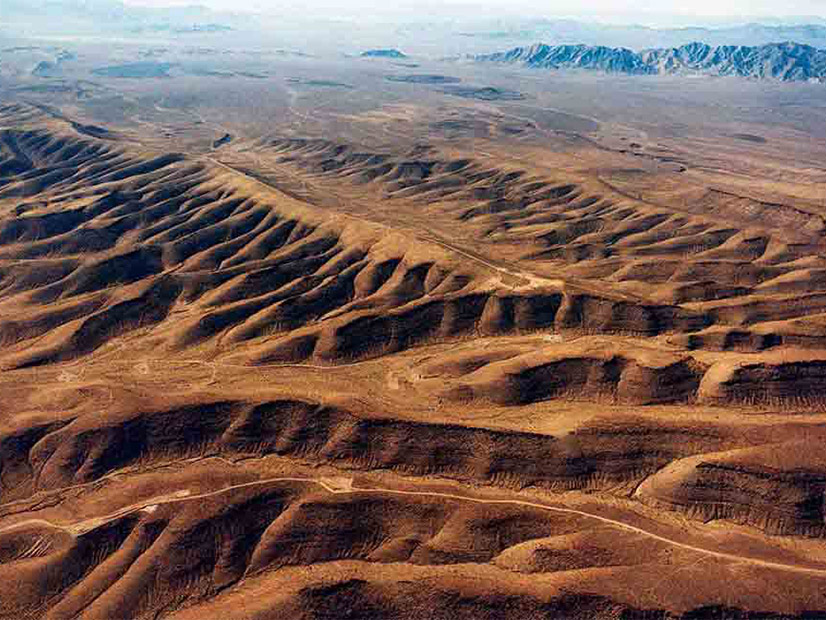
A Nevada lawmaker has introduced a resolution urging the federal government to use Yucca Mountain, once proposed as a dumping ground for the nation’s nuclear waste, as a site for renewable energy.
Senate Joint Resolution 4, introduced by state Sen. James Ohrenschall (D), was heard last week by the Senate Natural Resources Committee. The committee took no action.
SJR 4 “urges the federal government to use Yucca Mountain for the development and storage of renewable energy.” If passed, the resolution would be sent to federal officials, including the president, vice president, House speaker and energy secretary.
Not long ago, Yucca Mountain faced a “scary future” as the nation’s disposal site for high-level radioactive waste, Ohrenschall told the committee.
Now, he said, there’s an opportunity for “positive uses,” such as renewable energy or research.
“And if these positive uses happen, then I think it becomes exponentially less likely that the federal government will be able to say, ‘No, we need to take all the nation’s high-level radioactive waste and spent nuclear fuel, transport it across the country and send it here to Yucca Mountain,’ which I think puts not only our constituents in danger, but citizens around the country,” Ohrenschall said.
Renewable energy at Yucca Mountain has been discussed previously, including in a 2011 report from the U.S. Government Accountability Office that looked at alternative uses for the site. The report said a potential challenge to energy-related uses was the lack of nearby transmission.
On Thursday, supporters of SJR 4 noted NV Energy’s plans for Greenlink West, a roughly 350-mile transmission line that will run past Yucca Mountain and the neighboring Amargosa Valley community.
“We are in what they call the sweet spot for Greenlink and all the transmission lines and such,” said Carolyn Allen, chair of the Amargosa Valley Town Board.
Renewable energy development at Yucca Mountain would bring an array of benefits to the town, said Allen, who called SJR 4 “an excellent bill.”
“It can bring research,” she said. “It can bring new people that want to live there and raise families there.”
One person spoke in opposition to the resolution. Dylan Keith, assistant director of government affairs for the Las Vegas Chamber of Commerce, said the chamber supports renewable energy research and development.
But “the chamber has had a long-standing opposition to any development with the Yucca Mountain project,” Keith said.
Committee member Sen. Ira Hansen (R) said the nation’s move toward electrification and the growing demand for electricity raise complex questions. He said one issue is what to do with used solar panels and asked whether Yucca Mountain could be used as a disposal site.
“In the next 20 or 30 years, we’re going to have hundreds of thousands of those,” Hansen said. “What are you going to do with the old panels?”
Yucca Mountain was designated as the sole location for a national nuclear waste dump when Congress amended the Nuclear Waste Policy Act in 1987. Since the 1980s, the U.S. Department of Energy has spent billions of dollars studying Yucca Mountain as a disposal site for nuclear waste. The 230-square-mile site is about 100 miles northwest of Las Vegas.
But faced with strong opposition from the state of Nevada and Native American tribes, Congress stopped funding Yucca Mountain in 2010. In 2021, the Biden administration stated its opposition to using Yucca Mountain as a nuclear waste site. Instead, the administration has shifted its focus to “consent-based siting,” in which nuclear waste is stored in communities that agree to accept it.
In preparing its 2011 report on alternative uses for Yucca Mountain, GAO interviewed experts who had a wide variety of suggestions. Those ranged from a command center for unmanned aircraft, weapons testing, public emergency communications or a secure data storage site.
Energy-related ideas included a commercial energy park, with nuclear, solar and wind power generation. Research was another suggested use, with potential topics including carbon capture or compressed air or pumped hydroelectric energy storage.



